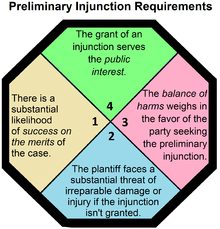Preliminary injunction

A preliminary injunction, in equity, is an injunction entered by a court prior to a final determination of the merits of a legal case, in order to restrain a party from going ahead with a course of conduct or compelling a party to continue with a course of conduct until the case has been decided. If the case is decided against the party that has been enjoined, then the injunction will usually be made permanent. If the case is decided in favor of the party that has been enjoined, the injunction will usually be dissolved or dismissed.
In most courts in the United States, the party seeking the preliminary injunction must demonstrate all four things together:
- That there is a substantial likelihood of success on the merits of the case,
- That they face a substantial threat of irreparable damage or injury if the injunction is not granted,
- The threat is immediate,
- That the balance of harms weighs in favor of the party seeking the preliminary injunction,
- There is no other available remedy,
- That the grant of an injunction would serve the public interest.
The "balance of harms" refers to the threatened injury to the party seeking the preliminary injunction as compared to the harm that the other party may suffer from the injunction.
The United States Supreme Court revisited the requirements for obtaining a preliminary injunction in Winter v. NRDC, Inc., 555 U.S. 7 (2008).[1] The Court changed one requirement just slightly:
"A plaintiff seeking a preliminary injunction must establish that he is likely to succeed on the merits, that he is likely to suffer irreparable harm in the absence of preliminary relief, that the balance of equities tips in his favor, and that an injunction is in the public interest."
See also
- ↑ Winter v. Natural Resources Defense Council, 555 U.S. 7 (2008).